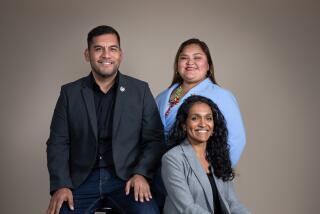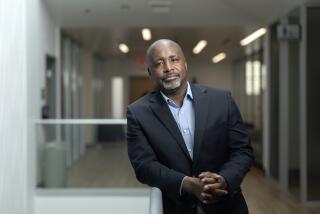Uniting a Quarrelsome Council Tops New Mayor’s Agenda
- Share via
Outlining his agenda for 1995, newly elected Santa Monica Mayor Paul Rosenstein said he hopes to introduce reforms aimed at making a “kinder, gentler” City Council.
“This council needs to try and concentrate more on what’s best for the city and less on preparing for the next election,” said Rosenstein, a first-term council member scheduled to face reelection in 1996. “Voters will respect us more if we do that.”
On the issues, Rosenstein said he expects the council to review an aggressive smoking ban approved in November, carry out plans for a new civic center complex, expand the downtown shopping district and deal with the impact of proposed changes in the state’s rent-control laws.
But he said his first goal is to improve the way the frequently fractious council does its business.
The council could improve its image among residents if its members spoke less during public comment periods, Rosenstein said. Some of the seven City Council members, he said, use their share of the question-and-answer periods to make political statements and ask redundant questions.
“I would like to encourage City Council members to practice restraint in the meetings,” Rosenstein said. “Otherwise, the council needs to impose rules that limit City Council members who tend to go on endlessly.”
Rosenstein was elected by the council on Dec. 13 to a two-year mayoral term as part of a deal that ended an impasse between two competing organizations represented on the council--the Santa Monicans for Renters Rights rent-control group and the Coalition for a Safe Santa Monica, a law-and-order group.
For a week last month, contentious council members failed to pick a successor to former Mayor Judy Abdo. But Rosenstein, a SMRR member, brokered an agreement under which he was elected mayor and Councilwoman Asha Greenberg, a member of the rival coalition, was elected mayor pro tem.
Rosenstein says that, initially, he was concerned that his deal-making would anger fellow council members and compromise his ability to build consensus. But since he was elected, Rosenstein says, he has detected encouraging signs of support from his council colleagues.
One of the first issues the council is scheduled to take up, on Jan. 10, is the proposed repeal of the city’s smoking ordinance, which bans lighting up in all indoor workplaces, including bars and hotel lobbies.
In the past, Rosenstein has voted against the smoking ban, which is more restrictive than bans enacted in Los Angeles and has drawn strong opposition from bar owners.
Last week, he indicated that he may consider changing his vote, a move that could shift the majority and keep the tough smoking ban intact.
Rosenstein said public safety issues will figure heavily in this year’s council deliberations.
A key challenge, he said, will be to start public discussion of the Santa Monica Civic Center project--particularly concerning construction of new fire, police and emergency-preparedness facilities.
“It was apparent after the (Northridge) earthquake that we need to move ahead with our emergency preparedness,” he said, citing what he considered the poor location of emergency operations, in the basement of City Hall.
Rent control, always a controversial subject in the city, is also likely to be on the agenda, the new mayor said.
With fewer rent-control advocates in the state Legislature, a key provision of the city’s strict rent-control law--that rents cannot rise to market levels when a unit is vacated--may be gutted in Sacramento this year or next.
“I will do whatever I can to maintain rent control in Santa Monica,” Rosenstein said. “There has been no change in my commitment to defend rent control.”
On budgetary matters, Rosenstein said he would like to boost city spending on capital projects, noting that the city’s infrastructure, including sidewalks and roads, has been “somewhat neglected in the dog days of the recession.”
In February or March, he said, the council will likely discuss the revitalization of the Bayside District, the downtown shopping area that includes the Third Street Promenade. Rosenstein said he favored expansion of the district--a quasi-public agency--to include both sides of 2nd and 4th streets, as well as 5th Street.
Rosenstein said he is under no illusions that the council’s job will be easy.
“I see a lot of challenges ahead,” he said. “That tempers my sense of excitement.”
More to Read
Sign up for Essential California
The most important California stories and recommendations in your inbox every morning.
You may occasionally receive promotional content from the Los Angeles Times.













